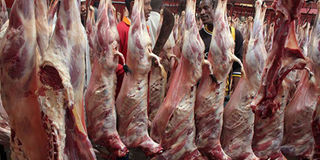With heavy rains during the festive season, beware of Rift Valley Fever

Kiamaiko market slaughterhouse in Nairobi. Do not eat meat that has not been inspected and stamped by an official health inspector as safe for human consumption. PHOTO | FILE | NATION MEDIA GROUP
What you need to know:
- All historic RVF outbreaks have been recorded following above average prolonged rains like the current ones.
- Home slaughters are unlawful as the animal is not taken through antemortem and postmortem examination to certify it safe for human consumption.
Just as the Kenya Meteorological Department had warned, above average and prolonged rains have been pounding the country.
The rains have come with a lot of challenges and the national and county governments have been working to minimise the negative effects of the torrents — such as disease outbreaks.
The Ministry of Health and the principal secretary for Livestock Development issued a joint statement on the likelihood of a Rift Valley Fever (RVF) outbreak in the country.
It included safety measures, what the national government is doing and what is expected of the county governments. Strategic vaccinations to prevent disease outbreaks have been done in the endemic areas.
RVF is a viral zoonotic disease — meaning it can be transmitted across animals and human beings.
RVF outbreaks follow heavy rains, which create favourable conditions for the multiplication of mosquitoes — the main vectors of the disease through their bites.
AWARENESS
All historic RVF outbreaks have been recorded following above average prolonged rains like the current ones.
And all have left in their wake economic losses through closure of livestock markets as well as animal and human deaths.
But with prior planning in collaboration with communities, veterinary and health workers, the losses can be minimised and the outbreak prevented.
The government is already creating awareness across all the audience groups to increase the risk perception index of the public and that of disease suspicion in veterinary and public health workers.
The goal is timely reporting and subsequently prevention interventions.
Recently, the Zoonotic Disease Unit (ZDU) trained medics and vets from Narok, Kitui and Mandera counties on RVF surveillance, social mobilisation, communication, prevention and control.
Counties have also been directed to heighten awareness on RVF for timely reporting of suspected cases.
SYMPTOMS
In animals, RVF manifests clinically through massive abortions in sheep and deaths of young stock.
Sheep and calves are considered the most susceptible; in other species, the disease will present with non-specific symptoms like fever, foul-smelling bloody diarrhoea and lack of appetite.
In human beings, RVF presents with fever, headache, weakness, nausea, stomach discomfort and headache and can result in death.
In the previous outbreaks the country lost vets who got infected while treating sick livestock.
The disease is transmitted from animals to human beings through contact with body fluids of infected animals.
This occurs during slaughtering and when farmers and vets assist their animals to give birth or during disposal of afterbirths without proper protection.
At most risk are vets, animal health assistants, slaughterhouse workers and farmers.
INSPECTED MEAT
The heavy rains, coupled with the festive reason, is, therefore, something that we must educate the public on to minimise the adverse effects of RVF.
As is customary of Kenyans, there will be a lot of slaughtering of livestock during this festive season. This year, however, a lot of caution should be practised.
Do not eat meat that has not been inspected and stamped by an official health inspector as safe for human consumption.
Home slaughters are unlawful as the animal is not taken through antemortem and postmortem examination to certify it safe for human consumption.
MEDICAL EXAMINATION
Handling an RVF animal could be catastrophic if slaughtered for consumption at home.
With increased demand for meat, let us be on high alert not to consume home-slaughtered animals.
Farmers should report abortions in their livestock to the vets for quick follow-up.
Similarly, any animal health worker who comes down with feverish conditions after treating an animal should present themselves to the nearest health facility for medical examination.
Dr Tuimur is the Chief Administrative Secretary in the Ministry of Agriculture, Livestock and Fisheries. [email protected]




